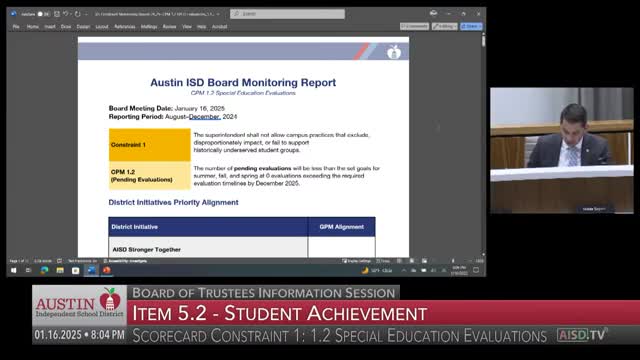Austin ISD reports sharp drop in out-of-timeline special-education evaluations; district names new digital system and staffing plan
Get AI-powered insights, summaries, and transcripts
Subscribe
Summary
Austin ISD told trustees it has cut out-of-timeline special-education initial evaluations to zero since August 2024 and reduced overdue reevaluations from the hundreds to 51 as of Dec. 2024. The district plans a new special-education digital management system, a staffing review and ongoing family engagement to sustain compliance and improve IEPs.
Austin ISD staff told trustees on Jan. 16 that the district has substantially reduced the backlog of special-education evaluations and is moving to institutionalize that progress by expanding staffing, professional learning and a new digital management system.
Superintendent Matias Segura framed the update as part of the districtagreed order with the Texas Education Agency (TEA) and the ongoing Priority 1A initiative to improve special-education services. Dr. Jennifer Baker and Dr. Cherry Lee presented an extended data analysis and a strategic-plan update that the board had received during 2024.
Top-line results - Initial evaluations: The district reported 0 initial evaluations exceeding the 45-school-day timeline since August 2024. - Reevaluations: The presentation showed a reduction in reevaluations past their three-year window from around 940 in January 2023 to 51 in December 2024 (about a 95% reduction). Staff noted the reevaluation pipeline is dynamic and will continue to require monitoring because reevaluation requests arrive year-round.
What the district did to reduce the backlog - Staffing and compensation changes: Administration said it raised compensation for educational diagnosticians and school psychologists in 2023 and hired aggressively; the evaluation team grew to 74–78 evaluators (LSSPs and diagnosticians) during the recovery period. Contractors were used heavily during the staffing ramp-up. - Process and scheduling changes: The district offered year-round testing windows (weekends, breaks, summer) and added extended weekday hours to increase capacity; staff also provided compensatory services when delays occurred. - Centralized data tracking: Dr. Baker described new dashboards that allow principals, case managers and central offices to see pending timelines and upcoming three-year reevaluation dates to schedule proactively.
Digital management system and procurement Administration said a new digital case-management system is required to sustain timely tracking and reporting. The presentation recounted the procurement timeline: a Bonfire request for quotes in November 2024, vendor selection and contract finalization in December 2024, and the district announced a selected vendor (Frontline special-education management modules) for the case-management system. Staff outlined a phased plan: data migration/validation in January–February, professional learning and train-the-trainer efforts through spring and summer, and broader rollout to campuses in the 2025-26 school year.
Special-education strategic-plan highlights The special-education strategic plan has five goals: an inclusive vision driven by shared ownership, high-quality MTSS-aligned instruction, fulfillment of evaluation timelines, high-quality individualized education programs, and improved student outcomes with accountability. Key items the district highlighted roughly parallel TEA priorities: - Family engagement and CFAC (the special-education family advisory committee) meets regularly; staff plan parent-facing materials and transition planning supports. - Transition services: the district offered multiple fall events and in-person fairs; staff cited partnerships with Austin Ed Fund and workforce agencies to support 18-plus and transition planning. - IEP quality: campus walk-throughs and IEP audits have reviewed several hundred files; staff identified needs in "present levels of academic achievement and functional performance" (PLAAFP) statements and transition supplements and scheduled targeted training (including half-day professional learning sessions for special-education staff on Jan. 29).
Staffing and sustainability The district said staffing remains a focus. Leaders described a steering committee and a forthcoming staffing analysis (with technical adviser Dr. Francis Stetson) to reduce long-term reliance on contractors and align full-time FTE allocations to workload for evaluators and related-service providers (including speech-language pathologists). Trustees were told that achieving sustainability will require a multi-year staffing and budget plan and that costs will initially increase during the hiring ramp-up before contracting expenditures fall.
Community and facility notes Trustees were shown an example of how operations investments support services: in December the district opened a new audiology booth at Galindo Elementary for the regional day program for deaf and hard-of-hearing students. Staff said the booth expands the districtability to provide no-cost hearing screenings and diagnostic services locally.
Board action and next steps Trustees voted unanimously to accept the monitoring report on special-education evaluations and asked for regular updates. Staff committed to monthly check-ins via the superintendent's report and ongoing dashboard reporting to the board as the district executes data migration to the new case-management system and completes a staffing analysis.
Speakers quoted in this article are drawn from the meeting transcript and include Superintendent Matias Segura, Dr. Jennifer Baker (executive director, operations reporting, compliance and evaluations), Dr. Cherry Lee (executive director, instructional delivery and inclusion), and other special-education team members.
